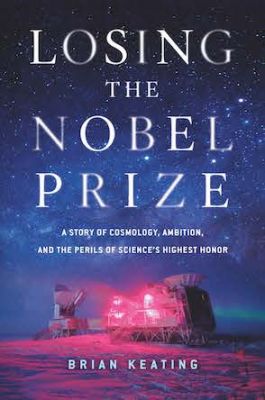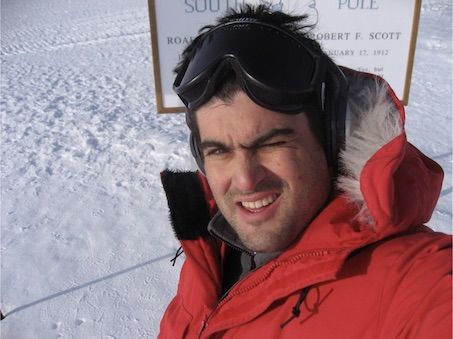
Scientific autobiographies tend focus on history's successes, with proud scientists revelling in the genius that led them to make groundbreaking discoveries. Very few scientists, however, are brave enough to dissect their spectacular failures, reflecting with brutal honesty on the biases, the fears, and the greed that led them to make poor ethical choices and high-profile blunders. But in a riveting account of the now infamous 2014 BICEP2 claim--and the subsequent humiliating retraction--of the first detection of ripples in spacetime, astronomer and BICEP2 team member, Brian Keating does just that.
"If true, this is one of the most important discoveries in the history of science." So said FQXi's scientific director Max Tegmark, in response to the BICEP2 team's announcement in March 2014 of the first detection of signs of so-called "primordial gravitational waves," set in motion just a fraction of a second after the big bang. These signs were picked up by the BICEP2 telescope, in the South Pole, which was scrutinising the leftover radiation from the big bang for a twisty pattern of light ("B-modes") made by these ripples. The gravitational waves were thought to have been generated during a cosmic growth spurt, when our early universe inflated at an exponentially fast rate. This process of inflation is something that many cosmologists believe must have occurred, but which has yet to be definitively confirmed.
A swish press conference at Harvard hailed the findings as the first detection of gravitational waves of any sort (coming, as it did, before LIGO picked up gravitational waves emanating from the collision of two black holes), as the first direct proof of inflation, as the first indirect evidence of the multiverse of parallel universes predicted to exist by inflation theory, and as the first probe of quantum gravitational effects. The astronomers behind the experiment, and the theorists behind inflation theory, seemed shoo-ins for Nobel Prizes. The media, and much of the physics community, went wild.
The only trouble was, of course, it wasn't true.
A few months later, the BICEP2 collaboration had to somewhat embarrassingly retract their claims. The team had indeed spotted the B-mode pattern they were looking for, but it was not caused by primordial gravitational waves, as they had initially hoped. Instead, they realized, the imprint was made as a result of light bouncing of galactic dust.
July 23, 2018
Losing the Nobel Prize: In this special edition, physicist Brian Keating discusses his new book, which recounts the ill-fated BICEP2 announcement--and retraction--of the claimed discovery of primordial gravitational waves in 2014.
Full Podcast
So what went wrong? That's the question at the heart of "
Losing the Nobel Prize," by cosmologist
Brian Keating of UC San Diego, who invented the telescope's predecessor, BICEP, and played a major role on the BICEP2 project. In a special edition of the podcast, Keating talks us through the events that led a team of brilliant scientists to make such a monumental mistake, and then proceed to unwittingly announce a bogus result--with huge fanfare--to the world.
Keating's intrigue-filled account of the BICEP2 team's dubious ethical conduct along the way to reaching the wrong conclusion makes a captivating read. The mess would have been averted if the team had an accurate measure of the dust contaminating the patch of sky they were viewing. The ground-based telescope's only rival in the hunt for B-modes, the far-costlier Planck satellite, was equipped to create precisely the dust map that they needed. But Planck's team members would not release this valuable data to the BICEP2 team--understandably so, given that they were potentially racing to the same result. As Keating eloquently puts it on the podcast (though with tongue firmly in cheek): "We desperately wanted to borrow their data. And when we couldn't borrow it, after begging for it, we basically stole it."
This 'theft' came about after one of the Planck collaboration gave a public talk with a slide that appeared to contain the dust information that BICEP2 needed. Some grateful BICEP2 members lifted it from the internet, and digitised this qualitative slide in an attempt to extrapolate quantitive information about dust levels, without consulting the Planck team. Therein lay their undoing. Had the channels of communication been open with Planck, they would have known that they were mishandling the slide, leading them to underestimate the role of dust and over-interpret the B-mode effect, wrongly attributing it to inflation. Their fear that Planck would sweep the Nobel Prize out from under their noses led them to rush their announcement, going public before the results had passed peer review.
On the podcast, Keating openly describes his concerns about the ethics around the use of this slide, and ways he would like the scientific community to change, to avoid similar dastardly deeds happening in the future. We also discuss the media hoopla that surrounded the announcement. Speaking as a science journalist, it was clear within days of the press conference that some cosmologists had doubts about whether the signal was more than just dust; yet it was a while before we in the media critically reported on the BICEP2 claim and gave voice to those misgivings. Interestingly, though, Keating stands by the team's decision to go public before peer review, arguing that, in this case, peer review may only have served to delay the claim's unravelling.

There are two major villains Keating identifies that, he says, must share some of the blame for the debacle. The first is the galactic dust that quite literally clouded the team's judgement. In the book, he skilfully presents the history of the universe seen through the eyes of an experimentalist. Rather than simply focusing on the much-lauded successes of Galileo, Hubble, and others, as so many popular accounts have done before, he provides the lesser-told stories of how they too, like many others throughout history, were sometimes tricked into misreading their observations by that pesky dust. This alternative version of cosmology is deftly interwoven with his witty account of his own personal, and at times deeply moving, quest to build a Nobel-winning experiment, in part, to impress his estranged father.
It's this hunger for fame and recognition that sets up the second villain of the book: the Nobel prize itself. Keating calls for a wholesale change in culture away from "Nobelism"--the religious devotion that scientists have for this hallowed award. On the podcast, he enumerates ways to improve the prize to make it more inclusive, and to better represent the large-scale collaborations that underpin successful experiments. Perhaps most provocatively--and something we don't get into in the podcast, but you can read about in the book--Keating also argues that Nobels should only be given for "serendipitous" findings. In that case, neither BICEP2 nor Planck would have been eligible, had either found signs of primordial gravitational waves, because both were designed to hunt for these, from the outset. By contrast, the accidental discovery of the accelerated expansion of the universe by the two competing teams, which garnered Nobels for Brian Schmidt, Adam Reiss, and Saul Perlmutter, on both teams, would have qualified. But, I wonder, even if all Keating's suggested changes were taken on board by the organisers of the Nobel Prize, would that really prevent future scientists from being tempted to the dark side, by a lust for the award? On the podcast, we chat about just that issue.
If there is a weakness in Keating's book, it is in the sections devoted to criticising the prize. That's not because I particularly disagree with his suggestions, but because it seems unlikely that the Nobel bigwigs will pay much heed; Keating may as well rage against the dust in the heavens that plagued his experiment. Nonetheless, I would highly recommend the book for its terrific and rarely-told alternate history of cosmology from an experimentalist's viewpoint, and its compelling insight into the human frailties behind what ultimately failed to be one of the most important discoveries in the history of science, but still stands as one of the most fascinating incidents in the sociology of science.